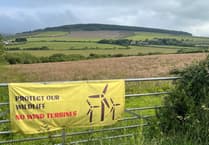Chief Minister Alfred Cannan says there have been ‘constructive and productive discussions’ with his British and Irish counterparts over unlocking the opportunities of renewable energy.
And he says the island is ‘just about on track’ to meet its 2030 target on cutting carbon emissions - but it was getting ‘increasingly tight’.
Mr Cannan was speaking at a press conference which followed the 41st British-Irish Council summit hosted by the Isle of Man government.
The BIC is celebrating its 25th anniversary this year.
Other delegates included Irish Taoiseach Simon Harris, UK Secretary of State for Northern Ireland Chris Heaton-Harris, Scottish First Minister John Swinney, Northern Ireland Deputy First Minister Emma Little-Pengelly and Northern Ireland Executive Junior Minister Aisling Reilly, Welsh Government Cabinet Secretary for Economy, Energy and Welsh Language Jeremy Miles, Guernsey Chief Minister Lyndon Trott and Jersey Chief Minister Lyndon Farnham.
Speaking at the post-summit press conference at the Comis Hotel, Mount Murray, Santon, Mr Cannan said: ‘We’ve had very constructive and productive discussions with the focus on unlocking the social and economical benefits and opportunities of renewable energy.’
The Manx government has committed to achieving net zero by 2050, with an interim target of 35% by 2030.
Meanwhile the Scottish government has rowed back on a commitment to cut greenhouse gas emissions by 75% by 2030.
Asked whether ambitious climate change mitigations targets set by governments were realistic, Mr Cannan replied: ‘We know it’s a challenging environment but there are significant opportunities particularly off-shore for all our nations and isles.
‘From an Isle of Man perspective we are pushing ahead now strongly with the 1.7gigawatt plans for Mooir Vannin windfarm.
‘We’ve got a good close working relationship with the developer and we’ve also pushed ahead quite significantly with proposals to try to develop on-shore as well
‘And we’ve set clear targets for that. So I do think that firstly it is about governments being clear about what they want to achieve and secondly putting in place the framework for private sector or public sector organisations to deliver within that.
‘But you can get complications along the way. There can be time delays but the important thing is that you are seeing an achieving clear progress.
‘For us we set the 2030 target and at the moment we are just about on track but it is getting increasingly tight.’
Mr Cannan said we won’t get a final decision on the Orsted windfarm plan until 2029 and we are going through the statutory process on-shore and that also takes time.
Scottish First Minister John Swinney said: ‘There has to be a clear consistent policy commitment to achieve net zero. The performance we’ve delivered in Scotland has reduced emissions by 57% since the 1990s so we are more than halfway there.
‘The recent issue we’ve had to address is the fact there are legally-binding targets and we have to put more time into those targets. It is a legislative issue we’ve confronted. We are making significant progress on renewables.’
Taoiseach Simon Harris said: ‘We are fully committed to the targets we’ve set. We are fully committed as they are the right thing to do. But we are also fully committed as we’ve taken a policy decision to ensure they are legally binding.’
Deputy First Minister of Northern Ireland Emma Little-Pengelly said: ‘These targets are challenging, we are all very aware of that. I think we have a responsibility to be honest with people about that.
‘That’s why events like today are really critical in trying to meet those targets as we can only do this with the right interventions and identifying those interventions is best done by collaborating together.’
Welsh Cabinet Secretary Jeremy Miles: ‘I think it’s in everybody’s interest that we achieve these targets. It’s about making sure that alongside seeing it as a challenge, we see the opportunity there is as well.’
Northern Ireland Secretary Mr Heaton-Harris, who is stepping down at the general election, said: ‘We don’t sing our praises enough as we have moved massively in this time.
‘In the last quarter of 2023, a quarterly record share of the UK’s total electricity generation came from renewables or renewable sources and for the first time ever those sources accounted for over half of the UK’s electricity generation in that period.
‘We should be proud of that. There’s plenty more to do. We are on a journey to get to the place we know we need to get to.’
Guernsey’s First Minister Lyndon Trott said there is no doubt the targets are challenging - but for a number of reasons. He explained: ‘Demand for offshore wind infrastructure over the next few years is expected to exceed supply of the kit required.
‘So that’s one challenge. There will be by the end of the decade a global shortage of lithium, an essential component of battery storage
‘But what is not a problem is investment capital, there is no shortage of investment capital.’

.png?width=209&height=140&crop=209:145,smart&quality=75)

.png?width=209&height=140&crop=209:145,smart&quality=75)
-(1).jpeg?width=209&height=140&crop=209:145,smart&quality=75)
Comments
This article has no comments yet. Be the first to leave a comment.